
As controversy over President Donald Trump’s ties to Jeffrey Epstein continues to dog his administration, we speak with investigative journalist Vicky Ward, who has spent decades reporting on the deceased sexual predator, his rich and powerful associates, and the impact of his crimes. Much of Trump’s political base is in an uproar after federal officials declined to release government files about Epstein and his serial sexual abuse of women and girls, with Trump himself reportedly named in the documents.
“They were friends. They hung out with each other,” Ward says of Trump and Epstein.
Ward was among the first journalists to investigate Epstein when she profiled him for Vanity Fair in 2003. The magazine’s editor at the time, Graydon Carter, cut out the testimonies of two young women who had spoken on the record about Epstein’s abuse. Ward’s podcast and TV series of the same name is Chasing Ghislaine: The Untold Story of the Woman in Epstein’s Shadow, focusing on Ghislaine Maxwell’s role as a facilitator for Epstein’s crimes.
Transcript
AMY GOODMAN: This is Democracy Now!, democracynow.org. I’m Amy Goodman.
In an attempt to quell the MAGA base uproar over the Trump administration’s refusal to release the files of the dead serial sex abuser Jeffrey Epstein, President Donald Trump’s deputy attorney general, who is Trump’s former private lawyer, just finished two days, Thursday and Friday, of meetings with the convicted felon Ghislaine Maxwell, who’s serving a 20-year sentence for conspiring with Epstein to sexually abuse young girls. Deputy Attorney General Todd Blanche and Maxwell met for nine hours at the federal courthouse in Tallahassee, Florida. This is Maxwell’s attorney, David Markus.
DAVID MARKUS: Ms. Maxwell answered every single question. She never stopped. She never invoked a privilege. She never declined to answer. She answered all the questions truthfully, honestly and to the best of her ability.
AMY GOODMAN: The meetings with Ghislaine Maxwell at a federal courthouse in Tallahassee come as President, Trump faces growing bipartisan pressure to release the government’s files on Jeffrey Epstein, longtime friend of Donald Trump. On Friday, Trump was questioned if he considered pardoning Maxwell.
KEVIN LIPTAK: Would you consider a pardon or a commutation for Ghislaine Maxwell if she’s cooperating —
PRESIDENT DONALD TRUMP: It’s something I haven’t thought about. It’s really something —
KEVIN LIPTAK: If it’s recommended —
PRESIDENT DONALD TRUMP: It’s something — I’m allowed to do it, but it’s something I have not thought about.
AMY GOODMAN: One of the first accusers of Jeffrey Epstein says she warned the FBI and the New York Police Department to look into his relationship with Donald Trump as early as 1996. Maria Farmer is now suing the government, which she said failed to protect victims. In a new interview with The New York Times, Maria Farmer said her only sense of justice has come from the conviction of Ghislaine Maxwell, Epstein’s convicted sex trafficking accomplice. Maria Farmer also spoke on MSNBC with Jen Psaki about Ghislaine Maxwell.
MARIA FARMER: I’ve never met a more predatory, terrifying human being in my entire life. And neither had Virginia Giuffre, and neither has Annie or Anouska or many girls, like Chauntae Davies. There’s hundreds of us that were preyed upon by Ghislaine Maxwell. She’s a very dangerous person, and she threatened my life on many occasions. I’ve had to move and be in hiding because of this predatory child predator and just victim predator. So, it’s completely unacceptable for anyone to call her a victim. The woman is not a victim. She’s a victimizer.
AMY GOODMAN: So, that’s Maria Farmer, who has alleged that both Ghislaine Maxwell and Jeffrey Epstein abused her and her sister, Annie Farmer, who has testified about how Ghislaine Maxwell not only groomed and recruited her, but also took part in her abuse. Annie Farmer spoke on ABC News.
ANNIE FARMER: She was the one who asked me to undress. She was the one who exposed my chest. She’s the one who touched me. And I think that that was not unusual. I mean, that was something that came out in her trial and one of the things that she was found guilty of. If you — you know, the Department of Justice is clear on that, that she herself is a sexual predator who has participated in this abuse.
AMY GOODMAN: For more, we’re joined by Vicky Ward, longtime investigative journalist, host and co-producer of the series Chasing Ghislaine: The Untold Story of the Woman in Epstein’s Shadow. It’s a podcast series. It’s a TV series. Vicki Ward profiled Jeffrey Epstein for Vanity Fair in 2003.
Welcome back to Democracy Now!, Vicky. Let’s go back to 2003, before we talk about this deputy attorney general meeting, the fact that you tried to get Maria and Annie’s story out so many years ago. You would have broken this story. But you talk about how the editor-in-chief of Vanity Fair stopped you from doing this, and it came out to be just a kind of profile of Jeffrey Epstein.
VICKY WARD: That’s right, Amy. And thank you for having me.
Yeah, you know, I was assigned to write about Jeffrey Epstein, who was an enigma back then. He was not someone whose name was in the newspapers, except for the fact that he popped up in the fall of 2002 as having flown Bill Clinton on his plane to Africa. And on the back of that, I was assigned to go out and find who this kind of Gatsby-like figure was, who lived in the biggest private townhouse in New York, who had an island, ranch in New Mexico. Where had his money come from?
And along the way, I discovered that he had a reputation for having a lot of young women around him. This was in addition to Ghislaine Maxwell, who was sort of like a Girl Friday. It was — her role became sort of very nebulous. And I did encounter the two Farmer sisters, who told me their harrowing stories. They went on the record, which was a very brave thing to do, given, as you heard Maria Farmer just there saying that, you know, she felt they were coming after her for a lot of her life.
And, you know, it was a difficult time for me. I was on a high-risk pregnancy, so once I had handed the piece in, I went on bed rest before I ultimately went into labor. Jeffrey Epstein was threatening me and telling me he was going to find out where I was giving birth, and he was going to have a witch doctor place a curse on my unborn children, if he didn’t like this piece. He was clearly furious about the fact that I had spoken to the Farmer sisters. That, more than anything else about what I had uncovered, enraged him. And when I was at home on bed rest, I heard from a fact-checker at the magazine, who emailed me, that he was in the Vanity Fair offices meeting with the editor-in-chief in person. I knew that the magazine —
AMY GOODMAN: This was Graydon Carter?
VICKY WARD: — was still waiting for photographs. Yes. And the next thing that I knew was, you know, when I saw a final galley of the piece, that was already on its way to appear in the published version of the magazine, the Farmer sisters’ allegations had been removed. And I will stress I didn’t, obviously, at the time have any idea of the scale of this awful sort of pyramid scheme that Jeffrey Epstein and Ghislaine Maxwell had going on with underage girls. But I did have the Farmer sisters. And obviously it was appalling, because they had gone on record, so Jeffrey Epstein and Ghislaine Maxwell were aware of what they had said. And it was a horrendous situation.
AMY GOODMAN: And so, Jeffrey Epstein, there was this deal that ultimately would take down Alex Acosta once he became secretary of labor, because he was the U.S. attorney in Florida that cut this sweetheart deal that meant Jeffrey Epstein could serve 13 months in a Palm Beach jail, leaving every day for about 10 hours, in which the allegations are he abused one young woman after another, 13 months, then he was out, and it would take until 2019 for the federal charges to be brought in New York. Now, that’s a lot to get in here. But these victims, let’s talk about how many you believe there have been. I mean, you have one victim after another saying they were victimized, and then Ghislaine Maxwell or Jeffrey Epstein would say, “Can you go get others?” One young woman said she can’t live with herself. She recruited like 40 kids in her high school, girls, often, you know, poor, needing money. They would be paid something like $200. Another said 60 — she recruited 60 friends. Are we talking upwards of a thousand people, children or young women, who were abused or raped by Jeffrey Epstein with the help of Ghislaine Maxwell?
VICKY WARD: Well, Amy, I mean, that’s actually a figure I think Pam Bondi — you know, I think she said “thousand.” I mean, one of the things that became very, very clear when, you know, I sat through Ghislaine Maxwell’s six-week trial was the sort of the cleverness, as well as the sickness, of the manipulation that went on inside Jeffrey Epstein’s household, beginning, if you like, with Ghislaine Maxwell, this very polished, sophisticated, Oxford-educated woman who spoke many languages, who knew presidents and heads of state all around the world. Once she had got these much more vulnerable young women inside that house, sort of effectively normalizing for them the incredible abuse that went on, you know, they were then incentivized to turn around and go and get, as you say, these other children. And it became — I mean, you know, one of the things that became very clear in her trial was the sickness, but also the scale of this web.
And, you know, one of the reasons that you sort of only had four victims come and testify at Ghislaine Maxwell’s trial was that there were complications with other stories, because, you know, Virginia Roberts, for example, who was, in a way, the single victim whose civil litigation against Ghislaine Maxwell ultimately caused this whole sort of house of cards to come tumbling down and Jeffrey Epstein finally to face the music in 2019, you know, Virginia Roberts’ story is a complicated one, because she then was accused of going out to recruit other girls. So, it’s a —
AMY GOODMAN: And Virginia Roberts, you’re talking about —
VICKY WARD: It’s a very complicated, horrible story.
AMY GOODMAN: Virginia Roberts, you’re talking about Virginia Giuffre, who was an outspoken survivor —
VICKY WARD: Yes.
AMY GOODMAN: — and ultimately sued Prince Andrew, settled for some undisclosed amount —
VICKY WARD: Yes.
AMY GOODMAN: — and apparently died by suicide, though it’s not clear if she died by suicide. It’s not clear Jeffrey Epstein died by suicide. But she just recently died in Australia at the age of 41.
VICKY WARD: Yes.
AMY GOODMAN: I want to get to President Trump, what his connection is to this, and who are the people who you feel have not been properly investigated, and this possibility — you heard Trump himself, you know, saying not clear whether she would be pardoned or her sentence commuted.
VICKY WARD: Right. And I also think, you know, it’s worth thinking about the fact that Ghislaine Maxwell is a citizen of many countries. You know, another option is whether or not she would be sent back to Europe or to England, you know, where there may be a different view of her, given her background.
AMY GOODMAN: “Given her background” meaning that she’s the daughter of Robert Maxwell.
VICKY WARD: Well, she comes — yeah, exactly. She comes from a family that’s very prominent socially in England that once held great power and great wealth. And, you know, it’s a different culture, different society. I mean, that, I think, would be an option.
AMY GOODMAN: He was — I mean, for people to understand, he was the — he was sort of the competitor with Rupert Murdoch, a media mogul, who she was very close to, and died mysteriously at sea, his body overboard.
VICKY WARD: That’s right. But he was also a politician. He was a massive worldwide publisher who had enormous influence all around the world. As you say, he died in very strange circumstances. He’s buried. He was given a sort of hero’s burial in Israel at the Mount of Olives. When he died, it emerged that he had basically robbed the pensions of his employees at this big media group. Two of his sons went on trial but were acquitted for that. But so, but this is a story that is very — this is a family, rather, that is very high-profile in England and in Europe.
You asked, Amy, though, about the relationship between Jeffrey Epstein and Donald Trump. You know, they were friends. They hung out with each other. These were two guys, you know, between Donald Trump’s marriages, who were single and who both hung out with models. Jeffrey Epstein’s main financial benefactor, Leslie Wexner, was the owner of Victoria’s Secret, the most sort of prominent, you know, modeling organization in the world. We know, particularly last week, The Wall Street Journal reported that when — for Jeffrey Epstein’s 50th birthday, the Journal claimed — Trump denies this, says it wasn’t him — that, you know, Donald Trump sent him a sort of racy congratulatory message alluding to Jeffrey Epstein’s private life. So, Donald Trump, you know, clearly, we do know, was aware of Jeffrey Epstein’s predilection for women and, you know, his sort of social life.
They did fall out. You know, interestingly, Donald Trump, who is very articulate about a lot of subjects, has not ever really explained why. He has said to, you know, campaign operatives around him, or did say back in 2014, when Virginia Roberts first sort of surfaced with her public claims about Epstein, that he had severed ties with him when Epstein had come after a daughter of a member of Mar-a-Lago. There is also reportedly a dispute that — well, there was a dispute between the two men over a piece of real estate near Palm Beach that both men wanted and that Donald Trump ultimately ended up getting at a bankruptcy auction and then flipped at a massive profit a couple of years later. But he’s never — he’s never actually talked about that in public. He has just said, you know, he’s just distanced himself —
AMY GOODMAN: We have 10 seconds.
VICKY WARD: — from Jeffrey Epstein.
AMY GOODMAN: But we’re going to continue with a post-show with you, because it’s really critical to talk about what are these files the MAGA base and many Democrats and Republicans have called for releasing. Vicky Ward, longtime investigative journalist, host of the series Chasing Ghislaine.

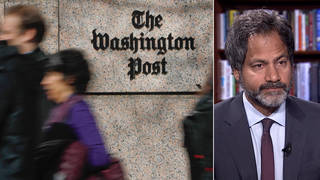
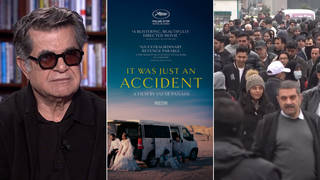
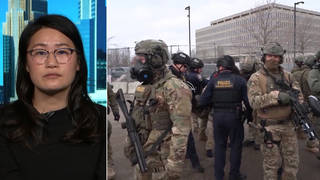
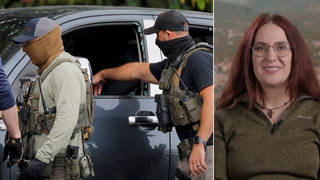

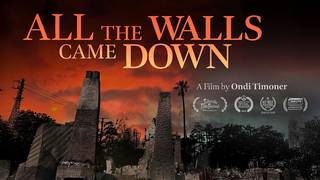
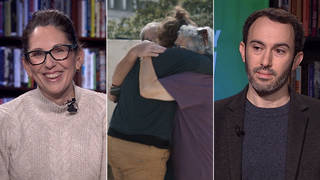
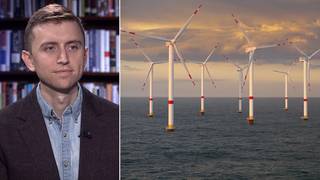


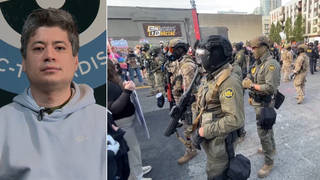
Media Options